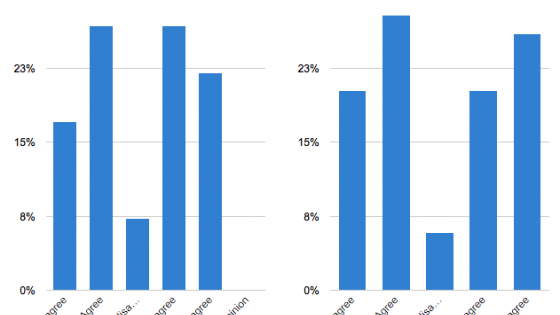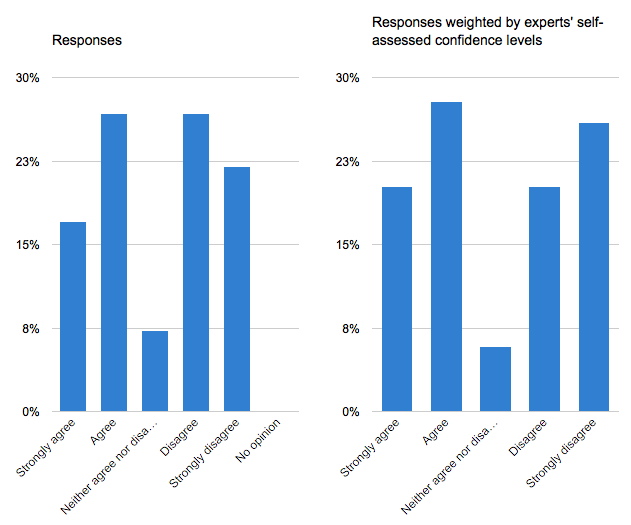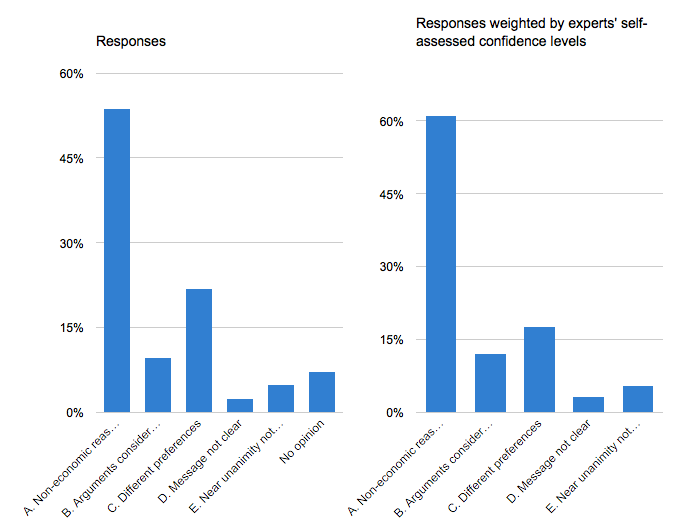Following the referendum decision for the UK to leave the EU, policymakers in both the UK and the EU face will face some difficult choices. These choices are likely to have non-trivial and long-lasting consequences, and macroeconomists can offer guidance on their macroeconomic aspects. This raises questions not only about what macroeconomists can do to obtain a good understanding of the needs of the countries involved, but also about the way that the macroeconomics profession as a whole can effectively make its position known to policymakers and the public.
Before the referendum, there was near unanimity in the profession on the negative economic consequences of a vote for Brexit.1 There are obviously many aspects that matter besides economic arguments, and the outcomes of elections and referenda are typically not easy to understand. But some have argued that neither the economic arguments nor the sureness of economists’ views reached voters and policymakers.
Paul Johnson, director of the Institute for Fiscal Studies (IFS), argues that the profession itself is responsible for these failings.2 He gives three reasons:
- First, the profession has failed to communicate basic economic concepts. In terms of arguments relevant to the Brexit referendum, Johnson mentions the mistaken beliefs that a fall in the exchange rate will make UK citizens richer and that there is a fixed number of jobs in the economy.
- Second, he points out that there is a “collective lack of speed, agility and focus on issues of overwhelming importance”.
- Third, there is a lack of leadership. In particular, the communication of economists’ views is left to individuals and institutes such as the IFS, the Centre for Economic Performance (CEP), the Centre for Macroeconomics (CFM) and the National Institute of Economic and Social Research (NIESR).
Evidently, there is no (prestigious) institution with the resources and skill to take serious action when the economics profession as a whole is so convinced that some important pieces of knowledge need to be revealed effectively and strongly. One institution that comes to mind is the Royal Economic Society (RES), but it is not currently set up to fulfil such a role. In fact, a visit to the RES home page shows little mention of Brexit.3 Similarly, although the Centre for Economic Policy Research (CEPR) has devoted attention to Brexit here on Vox, as an organisation they have not been part of this discussion. A reason for these organisations not to adopt institutional positions on such questions is that they operate as inclusive networks of researchers.
Simon Wren Lewis suggests that “[f]ailing to have a collective voice was compensated for on this occasion by letters and polls. … And right from the start, the long-term costs of Brexit were expressed in term of costs for the average household.” He thinks that part of the problem is “the lack of knowledge of economics (and in this case Europe) among many political commentators”.4 He adds that Paul Johnson’s critique “is like blaming scientists for not warning enough about climate change”.
There is also the possibility that the issue is not (just) about communication. There is the possibility that economists are simply not in touch with the problems that UK citizens typically face. Most academic macroeconomists interact frequently with institutions such as the Bank of England and HM Treasury, but less so with institutions such as the Joseph Rowntree Foundation that focus more directly on economic and social problems experienced by individuals and communities. So the issue may be that the economics profession is not just seen as part of the class that benefits from the modern economy, it is part of a different class – a privileged class that especially benefits from EU membership.
The latest CFM survey focuses on the question of whether some change is needed in the economics profession – and in particular whether (at least) some institutional change is needed to communicate the views of economists more effectively and possibly to represent the views of the profession as a whole.5
In other fields it is not unusual for prestigious institutions to search the public spotlight for important issues. For example, the Royal College of Nurses recently put out a warning on funding cuts and their likely negative consequences to the nation’s health.6 Such statements receive wide coverage in the press. Moreover, the press typically simply reports these statements and often provides additional background information. The views of economists are also aired in the media, but are usually accompanied with a disagreeing opinion even when few in the profession hold dissenting opinions.
Institutional changes in the economics profession?
The first question asks whether we should seriously consider ‘some’ type of institutional change in the economics profession. We understand that it is difficult to answer this question without providing a specific proposal. Panel members who think that some change is needed may very well differ in what kind of change is desired. Here, we just want to find out whether the members of our profession think that we should seriously aim for some substantial changes, or whether we should not.
Question 1: Do you agree that the economics profession needs an institutional change that promotes the ability to communicate more effectively with policy-makers and the public at large and to make clear when economists have a united view; and do you agree that we need to introduce leadership to help achieve this improvement through coordinated efforts?
Forty-one panel members answered this question, of which 44% either agree or strongly agree, 7% neither agree nor disagree, and 49% either disagree or strongly disagree. Weighted with self-assessed confidence, the balance shifts towards agree: 48% either agree or strongly agree and 46% either disagree or strongly disagree.
Although opinions seem to be split, the results of this survey question are still remarkable for two reasons.
- First, as indicated in the accompanying comments, many panel members who do not think that the profession needs “an institutional change … and introduce leadership” still point out that there are problems in the relationship of the academic macroeconomic community with policymakers and the public at large.
- Second, it is telling that almost half of the panel members think that the problems are serious enough to consider a substantial change in how the profession is organised.
This summary starts by reviewing some of the problems that the profession faces according to the panel members. Next, we discuss the reasons given why a change in the profession is either not desirable or not feasible. The discussion of this survey question ends with some proposals put forward by those who think that some change is needed.
Several commentators argue that some economic problems that are important to many are not getting sufficient attention by academics. Charles Bean (London School of Economics) writes that “[a]cademic economists need to be much better engaged with the concerns of policy makers and the public. Moreover, generally speaking the profession has gone backward in this regard over the past thirty years.” Ray Barrell (Brunel) points out that “the profession holds policy advice in low regard”. Specific examples given are distributional and regional issues and in particular their relationship with trade and migration. Social cohesion and political stability are also mentioned.
Nicholas Oulton (LSE) notes that “the economics profession is quite happy to discuss the effects of ethnic conflict on growth but in Africa. But any such discussion about Britain is either taboo or dismissed as non-economic.” Martin Ellison (Oxford) adds that “we need to bang on about poverty, distributional issues, regional policy and the like, just as much as financial market supervision and the value of the exchange rate”.
Several reasons are given for this concentration on a limited set of topics by our profession. Andrew Scott (London Business School) says that “we develop our own language and a reinforcing list of what the issues are. As a consequence what we say, how we say it and what we talk about do not connect with a range of issues that bother the wider public. Like many experts we prefer to talk amongst ourselves and like to use our language and our concepts and then blame others for not understanding them. In some ways this survey is another example. Who other than experts will look at the results?”
Ray Barrell (Brunel) argues that “the incentives we face need changing. Promotion depends on publications and REF [Research Excellence Framework] evaluations, and policy-related output is not highly graded. Whilst this remains the case we will not be noticed.” Similarly, Panicos Demetriades (Leicester) writes that “economics will only become more relevant if the top journals become more open [to papers that challenge the dominant paradigm]”.
Although there seems to be a consensus that the profession faces some problems and that there is scope for improvements, there is no consensus on the appropriate response. In particular, there is strong opposition to the possibility of an institution, leadership, or a coordinated effort to represent the views of academic economists.
A repeated argument given is the importance of academic independence. Ricardo Reis (LSE) writes that “[a]s intellectuals, we are more effective when we come up with independent thoughts and arguments that, then when put together, may end up making a diverse strong case for a particular policy option. … Having a ‘leader’ deciding on what is the ‘common view’ would be stifling to scientific inquiry and ultimately work against academic freedom.” A related argument is made by Patrick Minford (Cardiff), who says that “usually a head count of how many there were on each side does not establish which side is right, in ANY science”.
Even among the panel members that agree with the proposition that some change is needed, there is doubt over how to bring that about, and in particular whether a stronger RES or leadership could accomplish this. But some panel members do give specific suggestions. Tim Besley (LSE) writes that “in hindsight, HMT should have set up an expert body drawn from a range of respected economic experts and asked them to look at the evidence before the referendum – that would be the institutional solution I would favour. … The LSE growth commission recommended establishing a standing commission looking at long-term economic evidence and issues, which was independent of government and could offer advice on a range of long-term policymaking. … Had such a body existed, it could have served the role that I mentioned above.”
Simon Wren-Lewis adds that we need “regular surveys of ALL academic economists (not just its ‘stars’) to find out economists’ views on key issues”.
Finally, it should be mentioned that some panel members argue that there is also scope for improvement in terms of the way the media report on economic issues. David Bell (Stirling) would like to see “mechanisms being put in place to make the press more accountable for the statements that they make and a review of the BBC Charter so that it reflects the balance of argument among professional economists rather than always giving the impression that there are two sides to every argument (and therefore implicitly weighting them equally).”
The influence of economic arguments in the referendum
The next set of questions asks our panel members about the importance of economic arguments in the outcome of the referendum. Although our experts are very interested in this question and are likely to be careful observers, we want to stress that our panel members are not experts in understanding why voters vote the way they do. Thus, we are breaking new ground with this survey. Nevertheless, it seems natural to ask the profession’s views on whether the economic arguments that were put forward, often with a lot of conviction, mattered.
Question 2: What do you think is the most likely reason that a majority of UK voters went against the near unanimous advice of the economics profession?
1) Voters chose to leave the EU for non-economic reasons;
2) Voters did not believe the economic arguments put forward (for example, because they thought the arguments put forward by macroeconomists with dissenting views made more sense or because voters have little faith in economists in general);
3) Voters think that the preferences of economists do not align with their own preferences (this includes the possibility that they thought that the predicted negative economic consequences would not affect them personally);
4) Economists did not explain the reasons for this consensus in sufficiently clear language; or
5) Voters did not know that there was near-unanimity among economists.
In questions 3 to 7, we asked for each of these five possibilities whether they were ‘an important’ reason for the Brexit outcome.
Question 2 was answered by 41 of our panel members. A majority of 54% thinks that the most likely reason for the vote for Brexit was that UK voters considered non-economic arguments more important. With 22%, the view that voters perceive economists’ preferences to be different from theirs also receives non-trivial support for the reason most likely for a vote for Brexit.
In the corresponding follow-up question, a strong majority of 71% (when we leave out “neither agree nor disagree”) indicates that this misalignment did play an important role. A related point is made in a study by political scientists Matthew Goodwin and Oliver Heath: “the vote for Brexit was delivered by the ‘left behind’ social groups that are united by a general sense of insecurity, pessimism and marginalization, who do not feel as though elites, whether in Brussels or Westminster, share their values, represent their interests and genuinely empathize with their intense angst about rapid social, economic and cultural change.”7
A majority of 68% (leaving out “neither agree nor disagree”) thinks that voters did not believe the economic arguments put forward. The comments make clear that panel members have different views on why this is the case. Specifically, there is no consensus on whether there was something seriously wrong in how knowledge of the economists was communicated to the public at large.
Ethan Ilzetzki (LSE) writes “[e]conomists elaborated the costs of Brexit very clearly. I expect very few in the public were unaware of these costs and for the most part I think they believed the warnings. This was very picked up by the media and put the Brexit camp on the defensive. Michael Gove would not have resorted to attacking “experts” or comparing economists to Nazi scientists if he didn’t feel that our message was getting through to the public. Brexiteers consciously campaigned primarily on national pride (‘Independence Day’) and immigration, knowing that the economic cost-benefits were not their strong turf.”
By contrast, David Cobham (Heriot-Watt) says that “voters did not believe the economic arguments put forward, in part because we’re poor at explaining them to non-economists, and voters probably had little idea about the spread of economists’ views (partly because the BBC felt obliged to ‘balance’)”.
Others also take issue with the way the media represented economic arguments. Morten Ravn (University College London, UCL) comments: “The Press distorted the debate. The BBC, for example, gave as much airtime to the 1% minority of economists that supported Brexit as it did to the other 99%.” Nevertheless, fewer than 30% of the panel members (leaving out those that “neither agree nor disagree”) think that lack of knowledge of the near unanimity was an important factor and fewer than 5% think that it was the most important reason for the vote for Brexit.
Suppose the main assessments of our panel members are correct. Then one might conclude that this referendum was mainly about things other than economics and that economists should not worry much about the role that economic arguments played. Nor should they be concerned about the possibility that the economic arguments put forward were not received clearly and fairly.
But if our panel members are correct in thinking that a substantial fraction of UK voters believes that the opinions put forward by economists in the public domain only reflect what is beneficial for ‘their type of people’ and are not about objective research focusing on what is good for typical people and/or the country as a whole, then this is something that the academic community surely should take to heart.
One possibility would be to form a non-partisan committee with a wide set of representatives who might outline research questions thought to be important. Universities could then highlight how effective they are in making progress on these issues.
As an additional incentive, government funding – as determined, for example, by the Research Excellence Framework (REF) outcome – could be made dependent in part on how successful universities are in doing research related to these priorities. This suggestion is consistent with the recommendation of the just published independent review of the REF to emphasise impact on public engagement and understanding.8
Endnotes
[1] See https://mainlymacro.blogspot.co.uk/2016/05/economists-say-no-to-brexit.html and also the June CFM survey available at http://cfmsurvey.org/surveys/brexit-potential-financial-catastrophe-and-long-term-consequences-uk-financial-sector. In a recent survey of leading US economists, a large majority thought that the Brexit vote’s outcome would also have long-term negative consequences for the UK economy (and for the rest of the EU). See http://www.igmchicago.org/igm-economic-experts-panel/poll-results?SurveyID=SV_429IHJQVpBV1cnb.
[2] See http://www.ifs.org.uk/publications/8339
[3] Although Brexit was discussed in a plenary session at the RES 2016 annual conference, summarised on Vox: http://www.voxeu.org/article/royal-economic-society-s-panel-brexit
[4] See https://mainlymacro.blogspot.co.uk/2016/07/economists-brexit-and-media-epilogue.html
[5] Full results available at http://www.cfmsurvey.org.
[6] See https://www.theguardian.com/society/2016/jun/18/government-reckless-axing-student-nurse-funding
[7] See http://www.matthewjgoodwin.org/uploads/6/4/0/2/64026337/political_quarterly_version_1_9.pdf
[8] Available at: https://www.gov.uk/government/publications/research-excellence-framework-review







